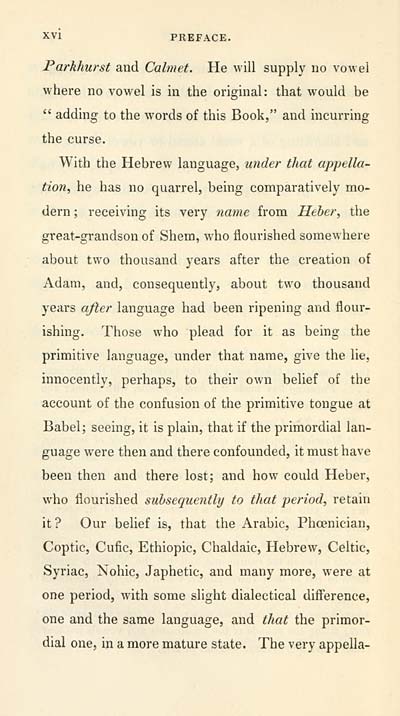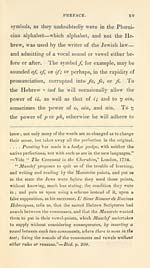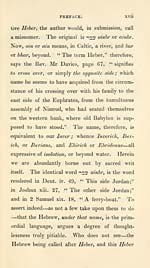Download files
Complete book:
Individual page:
Thumbnail gallery: Grid view | List view

Farkhurst and Calmet. He will supply no vowel
where no vowel is in the original: that would be
" adding to the words of this Book," and incurring
the curse.
With the Hebrew language, under that appella-
tion, he has no quarrel, being comparatively mo-
dern ; receiving its very name from Heber, the
great-grandson of Shem, who flourished somewhere
about two thousand years after the creation of
Adam, and, consequently, about two thousand
years after language had been ripening and flour-
ishing. Those who plead for it as being the
primitive language, under that name, give the lie,
innocently, perhaps, to their own belief of the
account of the confusion of the primitive tongue at
Babel; seeing, it is plain, that if the primordial lan-
guage were then and there confounded, it must have
been then and there lost; and how could Heber,
who flourished subsequently to that period, retain
it? Our belief is, that the Arabic, Phoenician,
Coptic, Cufic, Ethiopic, Chaldaic, Hebrew, Celtic,
Syriac, Nohic, Japhetic, and many more, were at
one period, with some slight dialectical diff"erence,
one and the same language, and that the primor-
dial one, in a more mature state. The very appella-
where no vowel is in the original: that would be
" adding to the words of this Book," and incurring
the curse.
With the Hebrew language, under that appella-
tion, he has no quarrel, being comparatively mo-
dern ; receiving its very name from Heber, the
great-grandson of Shem, who flourished somewhere
about two thousand years after the creation of
Adam, and, consequently, about two thousand
years after language had been ripening and flour-
ishing. Those who plead for it as being the
primitive language, under that name, give the lie,
innocently, perhaps, to their own belief of the
account of the confusion of the primitive tongue at
Babel; seeing, it is plain, that if the primordial lan-
guage were then and there confounded, it must have
been then and there lost; and how could Heber,
who flourished subsequently to that period, retain
it? Our belief is, that the Arabic, Phoenician,
Coptic, Cufic, Ethiopic, Chaldaic, Hebrew, Celtic,
Syriac, Nohic, Japhetic, and many more, were at
one period, with some slight dialectical diff"erence,
one and the same language, and that the primor-
dial one, in a more mature state. The very appella-
Set display mode to: Large image | Transcription
Images and transcriptions on this page, including medium image downloads, may be used under the Creative Commons Attribution 4.0 International Licence unless otherwise stated. ![]()
| Early Gaelic Book Collections > Blair Collection > History of the Celtic language > (22) |
|---|
| Permanent URL | https://digital.nls.uk/76178851 |
|---|
| Description | A selection of books from a collection of more than 500 titles, mostly on religious and literary topics. Also includes some material dealing with other Celtic languages and societies. Collection created towards the end of the 19th century by Lady Evelyn Stewart Murray. |
|---|
| Description | Selected items from five 'Special and Named Printed Collections'. Includes books in Gaelic and other Celtic languages, works about the Gaels, their languages, literature, culture and history. |
|---|

